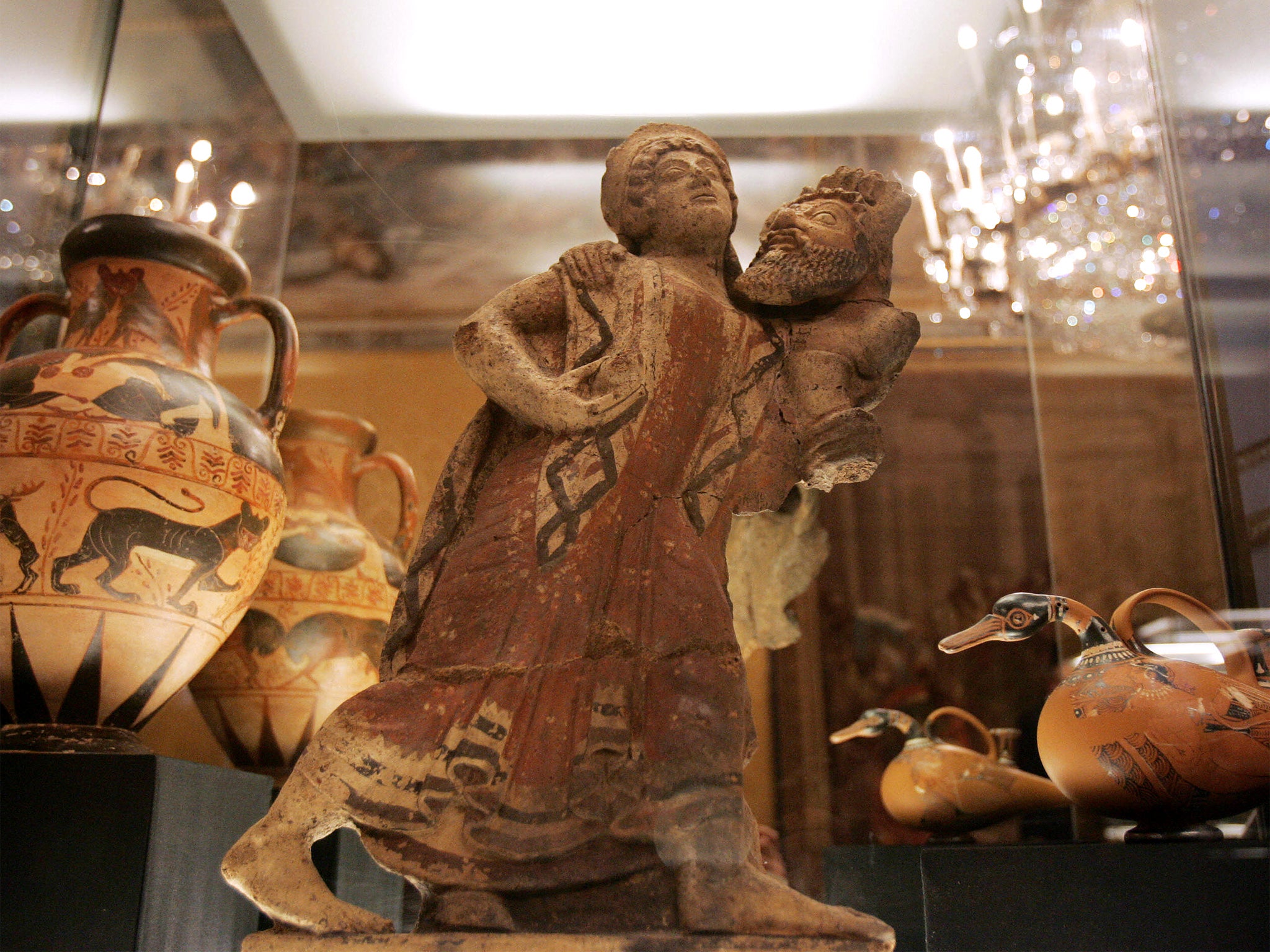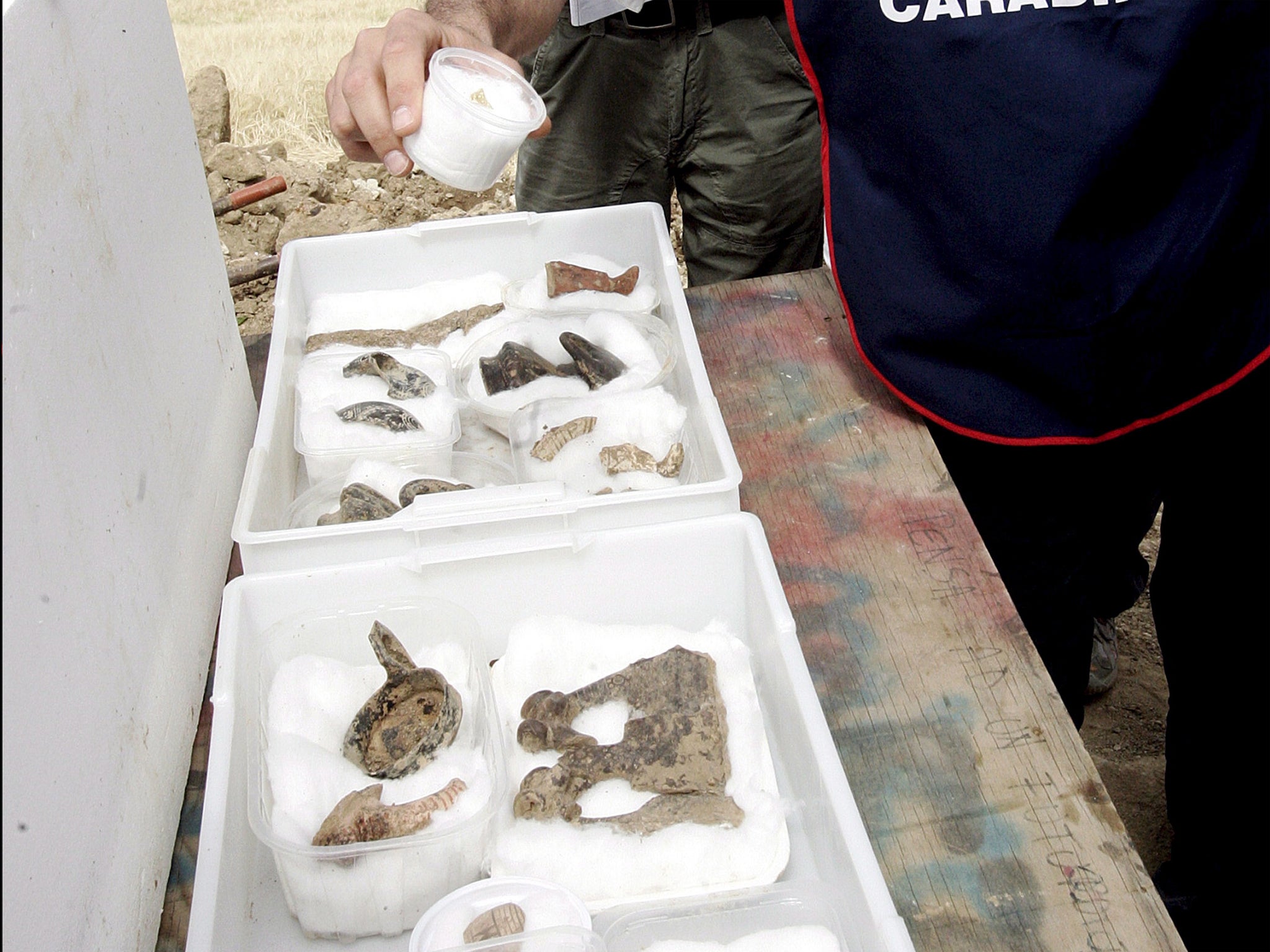Italy threatens legal action after British Government refuses to return artefacts seized from disgraced London art dealer
Sculptures of marble heads, a bronze bust of Alexander the Great and bronze statuettes of the gods form part of the collection

Your support helps us to tell the story
From reproductive rights to climate change to Big Tech, The Independent is on the ground when the story is developing. Whether it's investigating the financials of Elon Musk's pro-Trump PAC or producing our latest documentary, 'The A Word', which shines a light on the American women fighting for reproductive rights, we know how important it is to parse out the facts from the messaging.
At such a critical moment in US history, we need reporters on the ground. Your donation allows us to keep sending journalists to speak to both sides of the story.
The Independent is trusted by Americans across the entire political spectrum. And unlike many other quality news outlets, we choose not to lock Americans out of our reporting and analysis with paywalls. We believe quality journalism should be available to everyone, paid for by those who can afford it.
Your support makes all the difference.For three decades, Robin Symes was once one of London’s most successful antiques dealers, with a thriving business and a glamorous lifestyle of chauffeur-driven Bentleys to take him to and from his sprawling properties in London, New York and Athens.
But it all came crashing down when his his business partner and long-term companion, Christo Michaelides, was killed in 1999 by an accidental fall at a villa in Umbria. A bitter dispute with Mr Michaelides’s Greek family and a lawsuit left Symes bankrupt. He was later sent to prison and, in 2006, a book linked him to an illicit antiquities network. Now, as liquidators wind up Symes’s company to pay taxes owed to HM Revenue and Customs, a row is threatening to break out with Italy over the restitution of 700 ancient treasures in the firm’s collection.
Maurizio Fiorilli, the Italian state legal counsel who is overseeing the case, said: “The reality is the 700 objects are Italian and we have proved they are Italian. The Italian government intends to ask for their restitution.”
Italy says it will begin legal action if BDO, the accountant winding up Robin Symes Ltd, does not respond by the end of the month. “These objects were taken from illegal excavations carried out in Italy. We have the appropriate paperwork,” Mr Fiorilli said. “The liquidators must tell us if they intend to return the objects.”
The lawyer has worked on recovering the objects, with expert help, since 2007. Mr Fiorilli attempted to contact the liquidators by letter in 2012, detailing which objects should be returned, but had no substantive response. “This is not about money; it is about bringing back culturally important pieces back to their rightful home,” he added.
The Italian prosecutors could take on the liquidators in the UK under the Dealing in Cultural Offences Act. “This is a crime in Britain,” Mr Fiorilli said, adding that he would not wait for the prosecutor’s verdict before pushing ahead with a civil case.
The 700 disputed objects were excavated illegally and then sold “illicitly”, the lawyer claimed. The objects, including sculptures, jewellery and vases, were largely ancient Etruscan treasures from the Lazio and Tuscany regions.
Sculptures of marble heads, a bronze bust of Alexander the Great and bronze statuettes of the gods form part of the collection, which also includes a large terracotta statue of a seated goddess holding a dove and a pomegranate.

“For all this archaeological material, neither Symes nor the liquidators have the proof of provenience or the legal documents allowing them into the UK,” Mr Fiorilli said, adding that Symes was believed to have destroyed many documents relating to the objects. The Italian lawyers believe they have presented documentary evidence that proves the origin of the objects. “The twin of one of the vases is in a public collection here. You cannot contest some of these objects’ provenance,” Mr Fiorilli said.
Initially, relations were cordial as Italy sent over archaeologists to study the collection, with help from the Department for Culture, Media and Sport. As a mark of cultural collaboration, Mr Fiorille said, Italy would be willing to lend some of the objects to interested institutions in the UK.
“We want to provide a sign that our interest isn’t economic, it’s an interest in protection of our culture. In protecting that culture we still want collaboration. We hope the UK Government behaves accordingly,” he said.
Christos Tsirogiannis, an archaeologist who helped the Greek government with its own investigation into the Symes collection, described the affair as a “scandal for the British Government”. He told The Art Newspaper: “It would be good to have official announcements from all the governments concerned about the Symes case, so everyone can learn the whole truth about the key questions: why are the objects identified by the Italian state not being sent to Italy? Are the other governments concerned claiming any objects too? If so, how many and which are they?”
The Italian lawyers are understood to have become concerned recently by rumours that the liquidators may have looked to sell off the objects. Yet BDO insisted that it would “not take steps to sell antiquities subject to claims by third parties”. A spokeswoman for the company said: “The joint liquidators do not intend to comment on their activities in the liquidation, nor on their dialogue with any parties expressing an interest in the liquidation proceedings.”
Today was the ninth anniversary of Symes being sentenced to two years in jail. His fall from grace was written up the 2006 book The Medici Conspiracy by investigative journalist Peter Watson.
It traced the network of those illicitly raiding archaeological sites and those who were allegedly involved in selling them on. Symes had lived with his partner Mr Michaelides since the 1970s, with a house in London, flats in New York and Athens and a property on the Greek island of Schinoussa.
After Mr Michaelides died, questions about the provenance of objects in the Symes collection surfaced. In 2008, Bonhams auction house had to withdraw a disputed item from sale. Two years later, Italian police recovered 337 antiquities worth more than €15m from Symes in Geneva, where he had emigrated following his release from jail.
Join our commenting forum
Join thought-provoking conversations, follow other Independent readers and see their replies
Comments